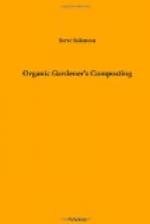Worms maintain their year-round population by overwintering and then laying eggs that hatch late in the growing season. The most harm to worm multiplication happens by exposing bare soil during winter. Worm activity should be at a peak during cool weather. Though worms inadvertently pass a lot of soil through their bodies as they tunnel, soil is not their food. Garden worms and nightcrawlers intentionally rise to the surface to feed. They consume decaying vegetation lying on the surface. Without this food supply they die off. And in northern winters worms must be protected from suddenly experiencing freezing temperatures while they “harden off” and adapt themselves to surviving in almost frozen soil. Under sod or where protected by insulating mulch or a layer of organic debris, soil temperature drops gradually as winter comes on. But the first day or two of cold winter weather may freeze bare soil solid and kill off an entire field full of worms before they’ve had a chance to adapt.
Almost any kind of ground cover will enhance winter survival. A layer of compost, manure, straw, or a well-grown cover crop of ryegrass, even a thin mulch of grass clippings or weeds can serve as the food source worms need. Dr. Hopp says that soil tilth can be improved a great deal merely by assisting worms over a single winter.
Gardeners can effectively support the common earthworm without making great alterations in the way we handle our soil. From a worm’s viewpoint, perhaps the best way to recycle autumn leaves is to till them in very shallowly over the garden so they serve as insulation yet are mixed with enough soil so that decomposition is accelerated. Perhaps a thorough garden clean-up is best postponed until spring, leaving a significant amount of decaying vegetation on top of the soil. (Of course, you’ll want to remove and compost any diseased plant material or species that may harbor overwintering pests.) The best time to apply compost to tilled soil may also be during the autumn and the very best way is as a dressing atop a leaf mulch because the compost will also accelerate leaf decomposition. This is called “sheet composting” and will be discussed in detail shortly.
Certain pesticides approved for general use can severely damage earthworms. Carbaryl (Sevin), one of the most commonly used home garden chemical pesticides, is deadly to earthworms even at low levels. Malathion is moderately toxic to worms. Diazinon has not been shown to be at all harmful to earthworms when used at normal rates.
Just because a pesticide is derived from a natural source and is approved for use on crops labeled “organically grown” is no guarantee that it is not poisonous to mammals or highly toxic to earthworms. For example, rotenone, an insecticide derived from a tropical root called derris, is as poisonous to humans as organophosphate chemical pesticides. Even in very dilute amounts, rotenone is highly toxic to fish and other aquatic




